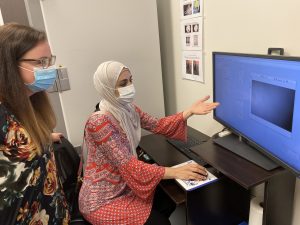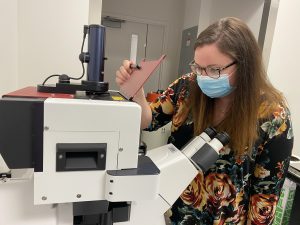
Nikki Reinemann (left), UM assistant professor of biomedical engineering, and her graduate assistant Omayma Al Azzam review the outcomes from their optical trap experiment. Submitted photo
Nikki Reinemann, assistant professor of biomedical engineering at the University of Mississippi, has received a prestigious three-year grant from the American Heart Association for her research into the underlying causes of heart disease.
Reinemann is hoping that her work may help physicians better understand the origins of heart disease, the nation’s No. 1 cause of death, according to the U.S. Centers for Disease Control and Prevention. Specifically, she is looking at the molecular mechanisms of muscle contraction and how they affect the heart.
“We understand how an individual molecule works,” Reinemann said. “We understand how a muscle functions. What I’m trying to understand is how do those individual molecules work together to achieve that muscular function.”
American Heart Association funding
To pursue this work, Reinemann applied for, and received, an Early Career Development Award from the American Heart Association. The grant is designed to advance the research skills of nontenured professors who have been in academia for less than five years.
And, it is a competitive field, with only 17% of research project applications accepted.
Reinemann will receive $231,000 over the three-year period. This will help fund the necessary materials, along with research assistance from two undergraduate students and a graduate student from UM engineering departments.
As a grant requirement, she pulled together a mentoring team to provide advice on project direction, management and future grant proposals. Ole Miss chemistry professor Nathan Hammer is serving as her primary mentor. This is particularly fitting as Hammer served as her research adviser when she was an undergraduate in chemical engineering.
“I am very proud to have had a role in her early development, and now I am honored to get the opportunity to collaborate with her on cutting-edge research projects,” Hammer said. “I have every confidence that her career as a professor here at UM will be very successful, and I am happy to be a part of it.”
A laser focus on a healthy heart
Reinemann is looking into the causes behind heart wall thickening or hypertrophic cardiomyopathy. This condition can cause shortness of breath, chest pain and even death in young adults. This is a personal challenge, as her father died of a heart attack in his 50s.
Her focus is on how myosins function. Myosins are motor proteins that serve as the main components of muscle fibers. Myosins bind actin filaments and help convert energy into movement.
Her goal is to understand how the myosins work together at the molecular level to achieve muscle contraction. This then allows for discerning where errors can occur that cause heart disease.
“Professor Reinemann’s research will shed much light on how the biological machinery in our bodies actually works,” Hammer said. “Specifically, her studies of actin-based molecular teams will reveal how these tiny motor proteins help drive muscle movement.”
She’ll be using a highly sensitive instrument known as an optical trap to examine the myosins. It incorporates a microscope and laser beam that can manipulate microscopic objects, much like tweezers, and measure movements and forces at a nano level. The University of Mississippi is one of the very few institutions in the region to have this specialized instrument.
Early career, great achievements
Reinemann joined the biomedical engineering faculty in 2018. She received her Ph.D. in chemical and biomolecular engineering from Vanderbilt University. Before then, she graduated magna cum laude from the University of Mississippi with Bachelor of Science degrees in both chemical engineering and chemistry.
Information about her Molecular Biophysics and Engineering Lab can be found at mbelab.olemiss.edu
